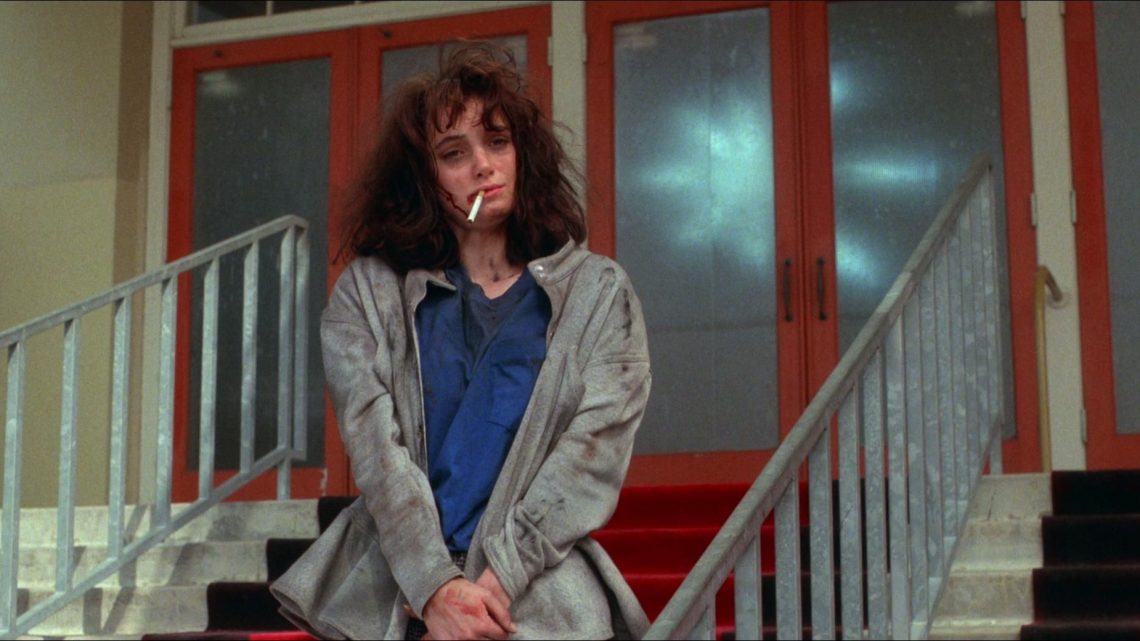
Thirty Years Later, ‘Heathers’ Is Still the Best Dark Comedy About High School Hell
November 19, 2019It's been 30 years since the phrase "fuck me gently with a chainsaw" became part of our cultural lexicon thanks to Heathers, the now-classic dark comedy starring Winona Ryder and Christian Slater that changed, and maybe foretold, the way we see teenage anger on screen and in real life.
Released March 31, 1989, the film has remained a cult classic and pop culture touchstone over its three decades of life, and is being celebrated with the Heathers 30th Anniversary Limited Edition Steelbook, out now. It's not hard to see how Heathers begat other mean-teen classics, and with the run of Broadway's Heathers: The Musical and a recent attempt at a television reboot (which was, unfortunately, repeatedly delayed and ultimately canceled because of negative early reviews and violent subject matter in the wake of the deadly school shooting at Stoneman Douglas High School), it seems fans aren't quite ready to drop the story of ruthless, croquet-playing girls and teen murder sprees, despite the stark world teens are living in today.
Regardless of any new incarnations of Heather, Heather, Heather, and Veronica we may get in the future, the O.G. is still something special—not just for fans, but for its creators as well.
"When I'm lonely and drunk at night out I'll look up 'Daniel Waters underrated,' 'Daniel Waters still relevant,'" joked Heathers screenwriter Daniel Waters, who spoke to VICE over the phone. "My new favorite thing is watching bootlegs of Heathers The Musical, performed in high schools, and they're really so touching and endearing because you can tell that they're so in love with [the] material."
The story—of Jason Dean (Christian Slater), a sociopathic boy who comes to an affluent high school and bewitches reluctant rich-bitch misfit Veronica Sawyer (Winona Ryder) into second-degree murder—came to Waters when he was a 22-year-old post-grad working at a video store in Los Angeles. He wanted to see a high school experience on screen that didn't feel like an after school special or soft, John Hughes-style coming-of-age film. Waters wanted to go dark and weird—the darkest and weirdest he could go. His own high school experience was nowhere near as traumatic or exciting as Veronica and Jason's; he was a columnist at the school paper who "had a good time" in high school. But his sister was a Veronica, and he was able to mine her experiences for his twisted tale of a very bad high school posse into a 215-page script (way too short, by industry standards). "But I was completely naive," he said.
Yet somehow, with its wackadoodle plot, bizarrely biting dialogue ("How very"), and pitch-black subject matter (suicide, murder, domestic terrorism), Heathers felt in 1989 like a strange reflection of our real, angsty teenage worlds. That feeling of doom not only remains; things feel like they've undoubtedly gotten bleaker. School shootings are far too commonplace, with real-life Jason Dean types seen taking their discontent to deadly extremes. But today's teenagers are also revolting against the violence and bullying depicted in the movie that have now taken over the headlines. If anything, Heathers might have given us a glimpse of how rebellion, while it can be used as a justification for sociopathy, can also be cathartic, even heroic.
"High school is our common experience. Not all of us went to war, but we all went to high school," said Waters. "Even though there are no cell phones in Heathers, and they have croquet instead of Twitter or Instagram, there's something everyone will always be able to relate to. I've had people of every age group come up to me and say 'Heathers got me through high school.' It's good to tell teenagers that everything's gonna be okay and it gets better, but sometimes you need a movie to tell them, 'oh no, you're right.' High school is the most terrifying, apocalyptic experience you'll ever go through. It'll infect you for all your life. I think there's something comforting in seeing the worst high school in the world."
Eventually the script landed with director Michael Lehmann, who, along with Waters and producers had to search for their Veronica. It was not an easy feat.
"You're looking for your co-lead of a movie. We had a hard time," he told VICE. "The movie was a low-budget film by a first-time filmmaker. A lot of the agencies in town didn't offer us access to their talent. It was really tricky."
After some auditions, and trying to score a young Jennifer Connelly for the role (she was underage and her parents refused to consider it), Lehmann saw Ryder in Lucas and thought she was perfect for the role. But he had to convince Waters and producers, since Ryder was relatively unknown at the time. It wasn't until Michael McDowell, the co-writer of Beetlejuice who had the same agent as Lehmann and Waters, got ahold of the script that Ryder became a more serious contender.
"They were shooting Beetlejuice. [McDowell] said 'Oh my god, Winona Ryder would be perfect in this role,' and he gave her the script. She read it and she flipped for it. She told her agent, and her agents said, 'I'm not gonna let you do this movie,'" recounted Lehmann. Instead of listening to her agent, Ryder met with Lehmann and co. and signed on to star.
"The problem was nobody had seen Beetlejuice. They were shooting it. Nobody knew what she looked like," added Lehmann. "The world was different. You couldn't just search on the internet and say, 'what does Winona Ryder look like today?' People said, 'Who's Winona Ryder? Does she mean anything? And the studio was like, 'We're not making the movie with her.' But we got it done, and she was absolutely the right person."
It's become one of Ryder's most iconic roles, and has inspired generations of teen movies and TV series even today. It's easy to see the shared DNA between Heathers and Riverdale, Euphoria, Jawbreaker, Mean Girls, Bring It On, Scream Queens, Gossip Girl, Glee, and countless others. The brutal content, the vicious one-liners, the impeccably cool outfits; it's all there.
"It is amazing that Heathers is the new bedrock. All the high schools after Heathers are built on Heathers. Everything's a little less naturalistic," Waters said. "Heathers is written in that way of like, if you had 30 minutes to come up with a better comeback or a better line, what would you come up with? Now I think maybe sometimes high school movies and high school TV shows, to their detriment, make all the teenagers a little too clever. Whether I should brag about that or not it, I helped create that legacy. I helped put poison into everything."
Looking back, Waters is happy he was a green kid when he wrote his greatest work. "If I knew a little bit more, I probably wouldn't have written it," he admits. And the fact that Heathers got made at all is a miracle. Both Waters and Lehmann agree on that.
It's Lehmann's hope that its legacy pushes Hollywood to take big swings, even with the darkest subject matter. "The honest thing is that 30 years later the problems, the issues, the things people get upset about, the way people behave, is all the same. If that's still the case 30 years from now, I still hope people can look back and say, 'the best way to understand all those incomprehensible things that people do to one another is with an ironic sense of humor,'" he said. "People get very serious, and they think there are subjects that can't be treated humorously whereas in fact the most disturbing ones need to be treated humorously."
In the meantime, Waters plans on living "off the fumes of people loving it."


